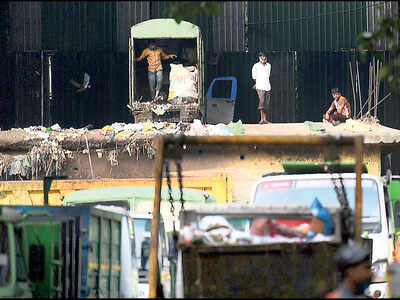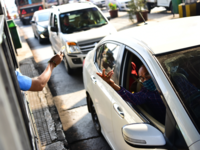PMC to start new de-addiction drive

Employees who clean drains and work with solid waste are more vulnerable to addiction of tobacco or alcohol due to working conditions and hours; FILE PHOTO
Officials aim at increasing productivity among employees; the workers’ union however wants to address the social factors that lead to addiction
Pune Municipal Corporation (PMC ) will soon start a de-addiction drive for its employees. The proposal was first put forth by the women and child committee chief, saying that it will gradually elevate the productivity of employees , along with helping them personally. Moreover, the initiative’s nitty-gritty and expenses will be taken care of by the civic body itself. The proposal, however, met with sceptical response from employees’ union members. They stated that such attempts have been made in the past and now, a holistic approach is required to understand the social complexities of the problem.
The initiative comes under the umbrella of efforts that PMC has been taking to combat addiction. Before, they had an anti-spitting drive to stop employees from consuming tobacco on duty. Those who spat were made to clean it in due course. While it helped the civic body clean up the stained parts of premises, the overall problem of addiction is still a concern — especially among those employees who clean drains, work with solid waste and so on. From alcohol to tobacco, they consume it habitually.
Sahasrabuddhe said, “Addiction not only hampers the individuals and their families, but also affects work. Many employees tend to skip work due addiction problems. Thus, we have decided to start a programme through which, PMC will pay the cost required for the employees’ hospitalisation and treatment at the de-addiction centre.”
Additional commissioner of PMC Rubal Agarwal also finds the idea appealing. She was once studying the medical bills of PMC employees of which there was one amounting to Rs 10,000. When she questioned the need for approval, she was told that it was from de-addiction centre which was not mentioned in PMC’s list of treatments.
“When we discussed this with Sahasrabuddhe, they tabled and sanctioned the proposal. We then decided to not only bear the cost but also give them paid leave during the time,” she said.
The programme will begin with workshops. It had been entirely designed byMuktangan Rehabilitation Centre . The facility’s director Mukta Puntambekar said, “We will conduct a series of workshops first aimed at awareness and fostering interaction with attendees. Through this we are hoping to identify people who need to get further treatment because no one is likely to come forward on their own. After this is done, they will then be referred to an outpatient department or hospital treatment based on their situation.”
The employees, however, want a different approach to deal with addictions. It involves identifying and moderating the social factors that aggravate the urge.Mukta Manohar , leader of PMC workers’ union, said, “We had raised this issue and had given proposals to PMC. Many social factors spark addiction. For instance, issues like working in the dirt and garbage constantly and the stress of the working hours need to be addressed. PMC needs to engage its employees in other work — like how we started teaching computer to the employees. Regarding paid leaves, one of the previous commissioners had sanctioned the proposal.” Manohar added that while PMC’s new initiative is commendable, they (employees) seek a well-rounded approach.
Pune Municipal Corporation (
The initiative comes under the umbrella of efforts that PMC has been taking to combat addiction. Before, they had an anti-spitting drive to stop employees from consuming tobacco on duty. Those who spat were made to clean it in due course. While it helped the civic body clean up the stained parts of premises, the overall problem of addiction is still a concern — especially among those employees who clean drains, work with solid waste and so on. From alcohol to tobacco, they consume it habitually.
Considering the plight, the women and child development committee chief Madhuri Sahasrabuddhe proposed the de-addiction drive. The programme is set to commence on January 11.
Sahasrabuddhe said, “Addiction not only hampers the individuals and their families, but also affects work. Many employees tend to skip work due addiction problems. Thus, we have decided to start a programme through which, PMC will pay the cost required for the employees’ hospitalisation and treatment at the de-addiction centre.”
Additional commissioner of PMC Rubal Agarwal also finds the idea appealing. She was once studying the medical bills of PMC employees of which there was one amounting to Rs 10,000. When she questioned the need for approval, she was told that it was from de-addiction centre which was not mentioned in PMC’s list of treatments.
“When we discussed this with Sahasrabuddhe, they tabled and sanctioned the proposal. We then decided to not only bear the cost but also give them paid leave during the time,” she said.
The programme will begin with workshops. It had been entirely designed by
The employees, however, want a different approach to deal with addictions. It involves identifying and moderating the social factors that aggravate the urge.
GALLERIES View more photos























Recent Messages ()
Please rate before posting your Review
SIGN IN WITH
Refrain from posting comments that are obscene, defamatory or inflammatory, and do not indulge in personal attacks, name calling or inciting hatred against any community. Help us delete comments that do not follow these guidelines by marking them offensive. Let's work together to keep the conversation civil.